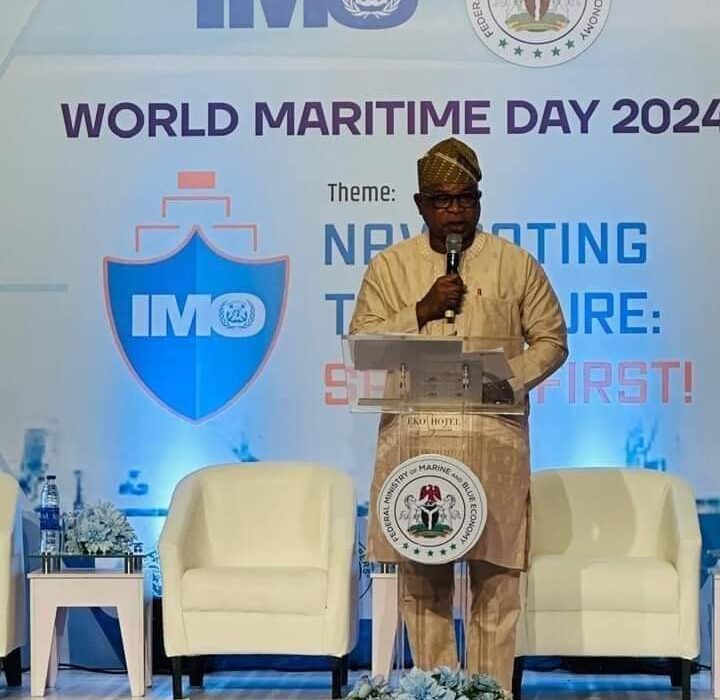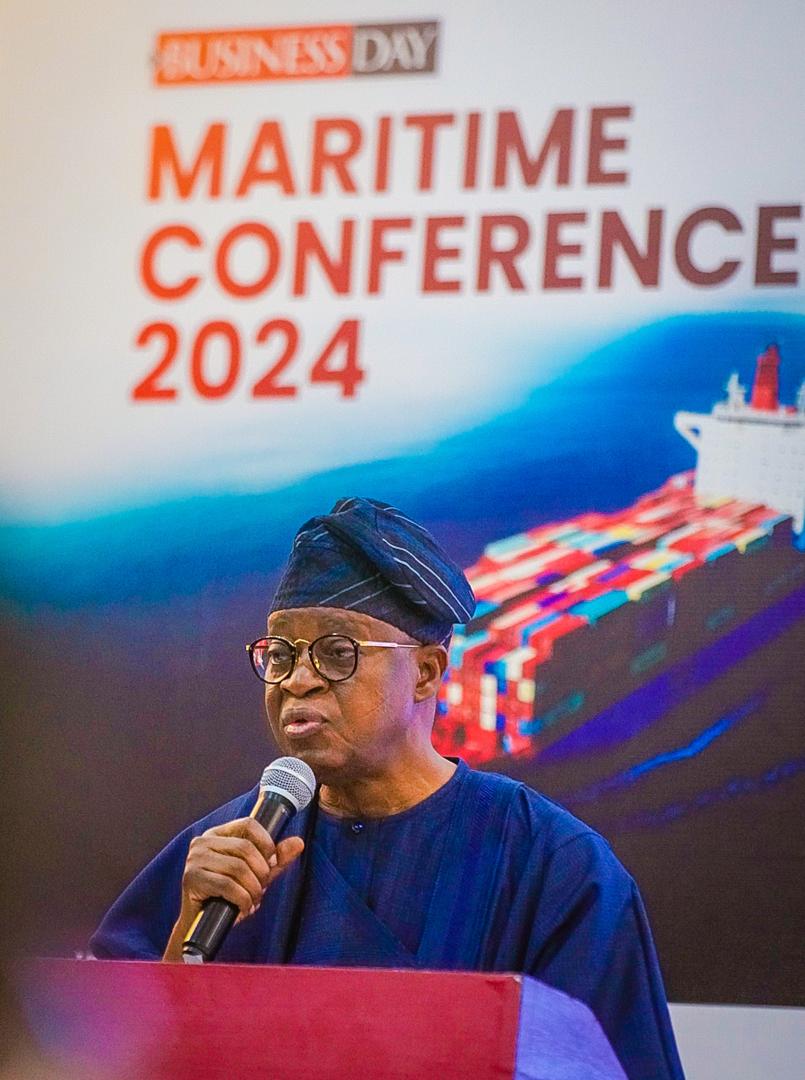The Nigerian Government has reiterated the need to invest in and upgrade port facilities, focusing on capacity building to ensure Nigeria remains competitive in global seaborne trade. This was emphasized on Thursday during the 2024 World Maritime Day celebration, held in Lagos.
In his keynote address, the Honourable Minister of Marine and Blue Economy, Adegboyega Oyetola, stressed that Nigeria must reassess the safety and security challenges facing its maritime sector. He emphasized the importance of addressing these challenges in light of new technologies and alternative fuels aimed at reducing greenhouse gas emissions (GHG) from ships.
Oyetola stated, “It is my pleasure to deliver this keynote address on the occasion of the 2024 World Maritime Day (WMD) celebration. Over the years, World Maritime Day has been a catalyst for transformative initiatives and policy advancements among member governments and the maritime community, fostering excellence in the sector. Each year, the global maritime community rallies around a theme set by the IMO Council. This year, 2024, the theme is ‘Navigating the Future: Safety First.’
“As we embrace this moment, we must re-examine the safety and security challenges that confront our maritime sector, particularly in the context of new technologies and alternative fuels that aim to reduce greenhouse gas emissions (GHG) from ships. To safeguard both shipping safety and operational efficiency, it is imperative that we invest in upgrading our facilities and building capacity to ensure Nigeria remains competitive in the global arena of seaborne trade.”
In line with President Bola Ahmed Tinubu’s “Renewed Hope Agenda,” the Federal Ministry of Marine & Blue Economy is actively taking steps to improve the maritime sector by embracing new technologies and encouraging innovation to drive growth. Oyetola noted that key initiatives include digitalizing and automating port operations to enhance safety, security, efficiency, and performance. These initiatives aim to reduce costs, increase reliability, and promote sustainable development within the industry.
“As you are aware, the administration of President Bola Ahmed Tinubu, GCFR, is investing heavily in port modernization to reduce inefficiencies, lower operational costs, and improve safety in our ports. This process is being financed through public-private partnerships (PPP) arrangements,” Oyetola added.
Abubakar Dantsoho, the Managing Director of the Nigerian Ports Authority (NPA), also spoke at the event. He highlighted the NPA’s collaboration with the Mission to Seafarers and the development of the Seafarers Centre, emphasizing the agency’s ongoing commitment to the development of human capital in the maritime sector.
Dantsoho said, “Beyond the fanfare, there is a need for every stakeholder here represented to arise from this celebration with a stronger commitment to take actions that create a better world for these distinguished calibre of men and women who power the maritime sector. Cognisant of the impact of the seafarers who propel the maritime sector on our port ratings, the Nigerian Ports Authority in 2023 urgently reconstructed and fully equipped the Mission to Seafarers facility in Lagos to regional best-in-class status to provide shore leave for seafarers.”
He noted that the reconstructed facility addresses the need for seafarers, who spend extended periods at sea, to have a place where they can access the internet, contact family, receive welfare support, and take shore leave for medical or psychological care.
“The partnership with the Mission to Seafarers and consequent development of the Seafarers Centre is a testament to our relentless commitment to maritime sector human capital development,” Dantsoho added.
In addition, Dantsoho explained that the automation of port operations is key to enhancing efficiency, stating, “Realising that automation is the linchpin of port efficiency, the Nigerian ports are at conclusive stages of the deployment of the Port Community System (PCS), which actually sets the pace for the operationalisation of the National Single Window Project of the Federal Government.”
He noted that alongside this, there is ongoing modernisation of port infrastructure and equipment to improve Nigeria’s global competitiveness. He stressed that making global port operations safer, healthier, and more secure depends heavily on the policies framed by stakeholders, investors, and government officials.
Also speaking at the event, Bola Oyebamiji, Managing Director of the National Inland Waterways Authority (NIWA), discussed the authority’s efforts to enhance Nigeria’s inland waterways. Oyebamiji noted that NIWA has been at the forefront of improving the navigability, safety, and accessibility of the country’s rivers and lakes, which are critical to facilitating trade and providing alternative transportation routes to ease road congestion.
“In Nigeria, we have made significant strides in the maritime sector, especially in enhancing our inland waterways infrastructure and services. The National Inland Waterways Authority (NIWA) has been at the forefront of these efforts, working tirelessly to improve navigability, safety, and accessibility across our vast network of rivers and lakes. Our initiatives have not only facilitated trade but have also provided alternative transportation routes that ease congestion on our roads.”
However, he acknowledged that challenges remain. “As we celebrate our successes, we must also confront the challenges that lie ahead. Issues such as pollution, climate change impacts, and inadequate infrastructure require urgent attention. It is imperative that we adopt innovative solutions and engage in meaningful dialogue with all stakeholders to address these pressing concerns effectively.”
He urged stakeholders to work together to promote sustainable practices in the maritime sector, saying, “I urge each one of you, the government officials, industry leaders, academics, and civil society, to join hands in promoting sustainable practices within our maritime sector. Let us work together to create policies that protect our waterways while fostering economic development. By doing so, we will ensure that future generations inherit a thriving maritime industry that continues to serve as a backbone for trade and commerce.”






